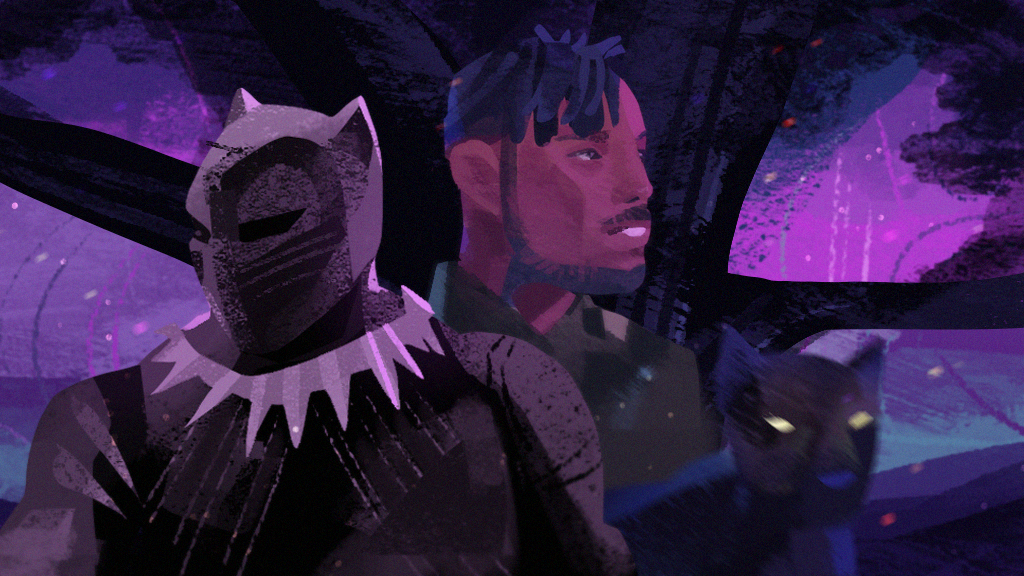"Black Panther" is set to become the highest grossing superhero movie ever. This blockbuster film directed by Ryan Coogler is a masterpiece that perfectly blends action, comedy and Afro-futurism. "Black Panther"'s mostly black cast, writing staff and even director marked a major milestone for representation. The film also shattered expectations with a whopping $1 billion in global earnings within its first month in theaters. However, prior to its overwhelming success many critics (wrongfully) predicted a box office failure because of a tired Hollywood myth that black-led films don't sell.
Creation of Black Panther
The character Black Panther was created in 1966 by Stan Lee and Jack Kirby. Formally inappropriately named the “Coal Tiger,” he was the first iteration of T’challa’s character. He first appeared as a guest star for the Fantastic 4 to appeal to a growing Black audience. Later renamed Black Panther, his role was that of a black activist motif, reflecting the sociopolitical climate of the 1960s Civil Rights era.
As the movement faded over time, so did the interest of the white writers who had been creating these black-centered stories. Black Panther was not revived
Priest revamped T’challa’s backstory and created the beautiful, futuristic mythology of Wakanda as well as the image of the Panther God, Bast. Since then, Black Panther’s popularity has exploded and the character is now one of the most prominent members of The Avengers. Black Panther’s debut to the Marvel Cinematic Universe (MCU) was based off Priest’s characterization that was so widely popular among comic readers.
The most amazing part of this film is its unapologetic blackness that’s honest to its roots.
Wakanda Forever (Spoilers)
The story picks up after the events of "Captain America: Civil War" where T’challa’s father, the previous Black Panther and King of Wakanda, was killed in a terrorist attack by a brainwashed Bucky. T’challa is being crowned as the new king but is challenged by an outsider seeking revenge for his own father’s murder at the claws of the former king.
T’challa is aided in the story by his ex-lover Nakia, General Okoye, his genius sister Shuri and his mother Queen Ramonda to retake the kingdom. Bonus points to Coogler for having T’challa’s strongest support system be a group of badass black women. It's a great message for female empowerment!
Erik Killmonger serves as the main antagonist. Raised in the hood of Oakland, Calif., Killmonger’s story reflects the reality of many African Americans born into a life of double de-facto segregation, in which a community is divided by race and economic status simultaneously. Killmonger is the manifestation of the rage and resentment marginalized people have towards their oppressors. His brutal method of seizing the throne from T’challa and ushering in the global genocide of all white people makes him undeniably the villain. Nevertheless, his
There are many things to love about "Black Panther," whether it’s the brilliantly choreographed action sequences, the stunning visual effects or the unquestionable hotness of the entire cast. However, the most appealing aspect of the film is perhaps the fictional country of Wakanda, an African nation untouched by colonization. "Black Panther" explores the possibility of an African nation rich with natural resources such as vibranium, if it were allowed to advance without the disturbance of the slave trade or the exploitation by foreign powers. Although Wakanda’s culture is strictly isolationist, the main theme of the film is the promotion of activism and humanitarian aid for marginalized, oppressed communities. The most amazing part of this film is its unapologetic blackness that’s honest to its roots but also doesn’t sugarcoat the sensitive topic of American anti-blackness.
The real case of anti-blackness isn't overseas but right here in the good ol' U.S.A.
Myth of Black Marketability
If "Black Panther"'s five-week domination in the box office has proven anything, it’s that diversity sells. One of the greatest myths in cinema is that movies centering around Black culture are not marketable to a global audience. This myth was most prominent in regards to China’s box office — the second most profitable in movie sales next to America — which is notorious for anti-black views. However, "Black Panther" has become an international sensation, even in homogeneous countries not typically exposed to positive Black characterizations in cinema.
In a now viral video posted by Asian Boss titled “What Koreans Think Of Black Panther” South Koreans' responses to the film are discussed. Although the general responses were positive, many comments showcased foreign audiences' lack of exposure to Black media. Commentators confessed that prior to seeing the film they had looked down on black people for being enslaved and didn’t consider black women beautiful. This level of ignorance exists because many foreigners' only exposure to Black culture is through American cinema that primarily presents black people as thugs and addicts.
The problem isn’t that foreign box offices aren’t interested in black characters — it's that they don’t know what a true Black film looks like because they’ve only ever been presented with American stereotypes of Blackness. So, the real case of anti-Blackness isn’t overseas but right here in the good ole’ U.S.A. The most positive impact of the Black Panther film other than bringing a great comic character to the screen is that it might finally encourage Hollywood to invest in big budget films centered on Black culture.








